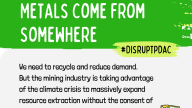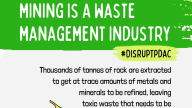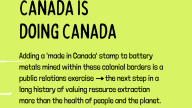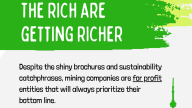Metals come from somewhere. Transition technologies like wind, solar, and electric batteries require significant amounts of metals and minerals. But far from investing in efforts to recycle and reduce our dependence on newly-mined materials, the mining industry is using this as an opportunity to push into even more sensitive areas key to regulating our global climate – like the Brazilian Amazon, the peatlands in northern Ontario, and even the deep seabed in the Pacific Ocean – without the consent of those most impacted.
Mining is a waste management industry responsible for some of the worst environmental disasters in history. Over the 25-year life of a typical mine, thousands of tonnes of rock will be extracted to get at trace amounts of metals and minerals, leaving a mess to be cared for in perpetuity (forever!). Massive amounts of waste is further generated during the refining process. In Ontario alone, there are an estimated 4500 contaminated mine sites, many of which have been entirely abandoned. People, not mining corporations, ultimately bear the burden of these toxic legacies.
The rich are getting richer. Despite the shiny brochures and sustainability catchphrases, the mining industry is a for profit entity focused on its bottom line. In the midst of a global health pandemic, the industry made record profits by putting the health of communities and workers at risk to continue operations. Mining companies will always prioritize profit and the interests of their shareholders over the communities most impacted by their operations.
Canada is doing Canada. While trying to paint itself a climate leader, Canada continues to approve and promote resource extraction projects classified as ‘carbon bombs’ – projects that will emit more than than 1 billion tons of carbon into the atmosphere, blowing Canada’s emission targets out of the water. Adding a ‘made in Canada’ stamp to transition metals sourced within these colonial borders is an exercise in public relations, in line with Canada’s long history of prioritizing resource extraction over the health of people and the planet.
Far from providing relief from extractivist pressure, the energy transition is being harnessed to accelerate it – unless and until we succeed in collectively pushing back. We need to work in solidarity to control this extractive economy, stop its expansion, and start to rehabilitate and repair its damages.




